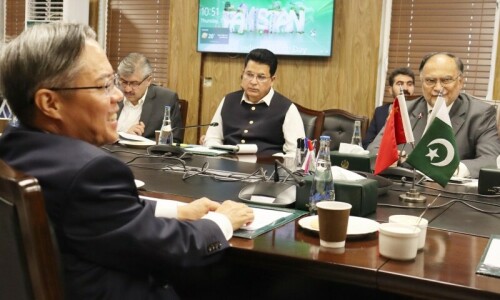SOME businessmen have an insatiable hunger for growth. S.M. Tanveer is one of them.
“If you do not grow your business, it will ultimately die,” he stresses in an interview with Dawn. “You don’t have to look hard to see that growth is at the centre of every successful business. No company can afford to stagnate.”
But, he notes, there isn’t a single recipe or path that leads to growth. “Every company and family has its own growth strategy that fits its circumstances and goals. The growth model of one company will not ensure success for another. Also, you have to consider all the peculiar business conditions and environment in which you are operating before deciding on the growth path you want to take.”
Little wonder, then, that he has chosen a route that is a digression from his family’s business path, and set up two separate lifestyle and entertainment companies that focus on the growing domestic market.
“Our family’s companies, the Din Group of Companies, have vended for brands ever since it entered into business. Now is the time to launch and establish our own brands,” Tanveer asserts.
A major reason for him to invest in the domestic market is the better investments returns it offers. “Growth in the export business is stagnating owing to a variety of factors: growing energy crunch, rising cost of doing business and poor security conditions etc. The domestic market, on the other hand, is expanding and people’s buying power is growing,” he points out.
His companies, grouped as Din Industries under the umbrella of the Din Group of Companies, plan to offer a whole range of lifestyle solutions to their customers. “We have launched brands of unstitched lawn for women, but ultimately plan to offer consumers everything that falls in the category of lifestyle — clothing, cosmetics, homes textiles, shoes, accessories and what not.”
While bigger profits were a major driver behind his decision to venture into new areas, the deteriorating conditions for manufacturers was yet another reason for him and his brothers to expand out of the family’s traditional textiles and leather export business.
‘We plan to develop one industrial estate in each district of Punjab to create jobs for people near their homes to plug the migration to major cities’
“The trust in the manufacturing industry in Pakistan has significantly eroded,” Tanveer says of his decision to take a different growth route, which is new to his family.
“As a manufacturer, the better part of my day is usually consumed in managing the day-to-day issues, such as the availability of gas and electricity to keep our factories running. Manufacturing has become unviable and trading profitable.”
He is dismayed that the government’s policies are working against existing businesses, forcing them to close down under the ever-increasing cost of production and exports.
“Many are already considering selling their factories and investing in the more profitable property business because of the government’s policies and financial losses.”
Tanveer admits that the lifestyle and entertainment business is also a difficult job. “The establishment of a brand requires a great deal of hard work. Only those brands that are able to control their costs, compete with imports from China and grasp the dynamics of the domestic market will survive.”
Apart from running his own business, Tanveer spends a lot of his time to see industrial expansion in Punjab.
Five years ago, the state-of-the-art Sundar Industrial Estate (SIE) near Lahore was facing the threat of turning into yet another industrial slum in Punjab, where most plot owners were waiting for the real estate market to recover before they sold the land they had purchased at subsidised prices to build new factories and create jobs.
Others didn’t want to risk their money in the industry until the government removed energy shortages for manufacturers in the province and arrested the macroeconomic decline.
That wasn’t all, though. The holding company, the Punjab Industrial Estates Development and Management Company (PIEDMC) — founded by the government in 2003 to create ‘state-of-the-art industrial infrastructure’ in public-private partnership mode to attract foreign and domestic investment — was in trouble owing to gross mismanagement.
By 2010, it had already run out of cash to pay its employees and the will to compel the SIE plot-owners to comply with their commitment of setting up industries. It was at that point that the provincial government decided to restructure its board and appoint Tanveer as its chairman.
Ever since his appointment, he has turned around both the PIEDMC and the SIE. The PIEDMC has now become a profitable company that is developing new industrial infrastructure in Bhalwal, Vehari and Rahim Yar Khan, and planning estates in Gujrat and Pind Dadan Khan.
It is also managing and upgrading the old, run-down industrial estates in Lahore, Multan and Chunian, and has been entrusted to set up the apparel park along the Lahore-Islamabad Motorway for Chinese investors. The infrastructure for the 1,000MW solar power park was also developed by the PIEDMC.
The SIE, which had only a few factories when Tanveer was handed the reins of the PIEDMC, now has about 350 small- and medium-sized factories set up by domestic and foreign manufacturers. These are providing around 50,000 jobs. TetraPak’s SIE plant, for example, is its largest facility in Asia.
“The PIEDMC is developing all new industrial estates from its own pocket. Generating cash for new projects was and still is a tough job. But we are not getting any grant from the government for any of the projects controlled by the PIEDMC.”
But encouraging investors to risk their money in manufacturing in the existing environment is even tougher. “We plan to develop one industrial estate in each district of Punjab to create jobs for people near their homes to plug the migration to major cities. The speed of colonisation of the new estates, however, will depend on the creation of a favourable environment for manufacturing,” Tanveer concludes.
Published in Dawn, Economic & Business, June 29th, 2015
On a mobile phone? Get the Dawn Mobile App: Apple Store | Google Play














































